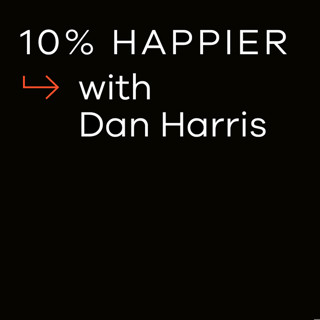
The Mental States That Steal Your Calm | Bhikkhu Bodhi
New episodes come out every Monday, Wednesday, and Friday for free, with 1-week early access for Wondery+ subscribers --- Ever have that experience where you catch yourself in a moment of anger, judgmentalism or fear? And, with a wince, immediately tell yourself a whole story about what kind of person you are? How do you stop this from happening or cut it short once it’s already begun? The answer? Mindfulness or having the basic self-awareness to see what kind of mental states are arising so that you are not owned them. To use a technical Buddhist term this is called, “mindfulness of mind.” It’s the ability to see your mind states without taking them personally and it comes from one of the Buddha’s most famous lists called the four foundations of mindfulness. Today we are going to learn about the whys and wherefores of mindfulness of mind from one of the most esteemed living Buddhist scholars, Bhikkhu Bodhi. Bodhi is a monk, originally from NYC. He is a prolific translator, scholar, and author of books on the Buddha’s teachings. He is also President of the Buddhist Association of the United States and co-founder and Chairperson of the Board of Buddhist Global Relief. This episode is the third installment of a series we've launched on the four foundations of mindfulness. In this episode we talk about: The historical backdrop of the four foundations of mindfulness What exactly the Buddha meant by “mindfulness of mind” How we can know whether or not we are being mindful How not to let our mindfulness become a sort of compulsive internal nanny state Practical instructions for the third foundation (given that the Buddha never actually gave them) And Bhikkhu Bodhi’s view that we should not be mindfulness zealots Photo Credit: Hsiao Ying Chang (史曉瑛) Full Shownotes: https://www.tenpercent.com/podcast-episode/bhikkhu-bodhi-502
21 Sep 202258min

Messiness Is Not a Moral Failing | KC Davis
New episodes come out every Monday, Wednesday, and Friday for free, with 1-week early access for Wondery+ subscribers. --- Today we’re talking about an often overlooked source of suffering— housework. There are so many ways in which housework can be a bummer. Maybe we’re feeling guilty about the fact that our place is always a mess. Maybe we’re driving ourselves crazy with obsessive cleaning. Maybe we have relatives who are overly critical about the state of affairs in our home. Maybe gender politics with our spouses and partners is a source of strife. Our guest today, KC Davis, helps deconstruct these often rigid and daunting cultural norms that surround the concept of domestic bliss. As a self-styled anti-perfectionist, Davis has garnered a huge audience on TikTok with more than 1 million followers. She has also written the book, How to Keep House While Drowning: A Gentle Approach to Cleaning and Organizing. On today’s show, she offers a ton of practical tips that are rooted in self compassion and the dogged determination not to use shame as a motivator when it comes to our domestic lives. In this episode we talk about: One of KC’s slogans,“You don’t exist to serve your space, your space exists to serve you” The difference between what’s “normal” and what’s “functional”. For example, why that pile of laundry on the floor is just fine if it works for you Why it’s important to think of house work as morally neutral. For example, why doing dishes has nothing to do with you being a good or bad person Why she doesn’t believe laziness exists The power of what she calls “category cleaning” Breaking the clean/not clean binary And achieving equitable division of labor around the house Full Shownotes: https://www.tenpercent.com/podcast-episode/kc-davis-501
19 Sep 20221h 3min

Malcolm Gladwell on: Working From Home, Kindness, Sacrifice, and Making Mistakes
New episodes come out every Monday, Wednesday, and Friday for free, with 1-week early access for Wondery+ subscribers. --- In this previously released episode, Malcolm Gladwell responds to backlash he received over his belief that working in an office—and the collaborative creative environment it can offer—is in your best interest (and in the interest of others). We also dive deep into some of the important themes featured in the seventh season of his podcast Revisionist History, including: kindness, generosity, and sacrifice. And, Dan and Gladwell share their biggest mistakes as journalists. Malcolm Gladwell is the president and co-founder of Pushkin Industries, and the author of six New York Times bestselling books including The Tipping Point, Blink, Outliers, David and Goliath, and Talking to Strangers. He’s also the host of the new Pushkin podcast Legacy of Speed. In this episode we talk about: The backlash Malcolm faced from his work from home comments Pushing the noise aside when it comes to social media Lessons in kindness from a recent Revisionist History episode The importance of flow states How he personally relaxes Why people should have a lifelong pursuit or practice What he thinks now about his famous 10,000 hours argument Why we need to engage and investigate the views of others to be morally alert as human beings His biggest journalistic mistake Content Warning: Brief mention of eating disorders. Full Shownotes: https://www.tenpercent.com/podcast-episode/malcolm-gladwell-486
16 Sep 20221h 1min

Unhappiness Is Not a Life Sentence | Christina Feldman
New episodes come out every Monday, Wednesday, and Friday for free, with 1-week early access for Wondery+ subscribers. --- Is it possible to be happy no matter what happens? Today we’re going right to the source of what makes us unhappy to learn how to disarm and disable potential suffering before it owns us. Everything that comes up in our mind is either pleasant, unpleasant, or neutral. In other words, with everything we experience, we either want it, don’t want it, or we don’t care. In Buddhism, this is called “feeling tones” or “vedana” and it is known as the second foundation of mindfulness in the Buddha’s comprehensive list. So why does this matter? Because if you are unaware of the pleasant, unpleasant, or neutral tones, then you are being controlled by them. Similarly, if you are unaware that certain people or things provoke aversion, then you can unthinkingly avoid or even be aggressive towards them. In this way, we can be like puppets on a string— just yanked around by greed, hatred, and numbness. Today’s guest, dharma teacher Christina Feldman, is going to drill down on this embarkation point for our suffering, zap it with mindfulness and help us understand how we don’t have to live like puppets on a string. Feldman began teaching in the west in the seventies after spending years in Asia studying Buddhist meditation. She is a co-founder of Gaia House, a retreat center in the UK, and has also served as a guiding teacher at Insight Meditation Society beginning in its early days. More recently, she is a co-founder of Bodhi College, which is dedicated to the study and practice of the early teachings of the Buddha. She is the author of a book called, Boundless Heart: The Buddha's Path of Kindness, Compassion, Joy, and Equanimity, and co-author of Mindfulness: Ancient Wisdom Meets Modern Psychology. This episode is the second installment of a series we've launched on the four foundations of mindfulness. In this episode we talk about: Why vedana is often called, “the ruler of consciousness” or “the king, or the queen of consciousness” How to practice with vedana, and the benefits thereof Her lovely description of the Buddha as being very focused on understanding “the architecture of distress and unhappiness” Her contention that unhappiness is not a life sentence. Her definition of genuine happiness What she means by the power of “giving greater authority to intentionality, rather than to mood or story” And her personal practice of setting life intentions every year Full Shownotes: https://www.tenpercent.com/podcast-episode/christina-feldman-500
14 Sep 20221h 2min

Why You’re Not Seeing the World Clearly— and How to Fix It | Jessica Nordell
New episodes come out every Monday, Wednesday, and Friday for free, with 1-week early access for Wondery+ subscribers. --- Jessica Nordell is a science and culture journalist who has written for the Atlantic and the New York Times. She earned a B.A. in physics from Harvard and an M.F.A. in poetry from the University of Wisconsin-Madison. Her new book is called The End of Bias, A Beginning: The Science and Practice of Overcoming Unconscious Bias. Photo Credit: Leslie Plesser In this episode we talk about: Why humans have biases What happens physiologically when biases are challenged Why some of the most popular personal and institutional strategies for confronting biases do not work The role that mindfulness and loving-kindness can play in reducing bias Full Shownotes: https://www.tenpercent.com/podcast-episode/jessica-nordell-rerun
12 Sep 20221h 2min

What "Getting Out of Your Head" Actually Means | Dawn Mauricio
New episodes come out every Monday, Wednesday, and Friday for free, with 1-week early access for Wondery+ subscribers. --- It’s such a common desire to get out of our heads — to escape the nonstop, mostly self-referential chatter, the habitual storylines, the ancient resentments and the compulsive self-criticism. Many of us take elaborate and even drastic measures in this regard like self-medication, shopping, tech addiction, and so on. But there’s a much healthier option that is readily and perpetually available. In fact, we’re dragging it around with us all the time, the body. The Buddha is said to have laid out four ways to be mindful. In other words, to be awake to whatever is happening right now. The first of these four foundations of mindfulness is mindfulness of the body and todays’ guest, meditation teacher Dawn Mauricio, will walk us through the practical applications of this foundation. Mauricio has been meditating since 2005 and is a graduate of Spirit Rock’s four-year teacher training program. She is also the author of the book, Mindfulness Meditation for Beginners: 50 Meditations to Practice Awareness, Acceptance, and Peace. Dawn’s been on the show before to talk about how to handle difficult people. This episode is the first installment of a series we've launched on the four foundations of mindfulness. In this episode we talk about: What it actually means to get out of your head and into your body and all of the practical ways to get there How strong emotions and seductive technology can work against us And what to do when being aware of your body might actually not be the best thing for you Full Shownotes: https://www.tenpercent.com/podcast-episode/dawn-mauricio-498
7 Sep 202254min

How to Deal With Emotionally Immature People (Including Maybe Your Own Parents) | Lindsay C. Gibson
New episodes come out every Monday, Wednesday, and Friday for free, with 1-week early access for Wondery+ subscribers. --- Emotionally immature people (EIP’s) are hard to avoid and most of us, if not all of us, have to deal with them at some point in our lives. These interactions can range from mildly annoying to genuinely traumatic, especially if the emotionally immature people in question are our own parents, which is true for an awful lot of us. Today’s guest, clinical psychologist Lindsay C. Gibson, gives advice for dealing with emotionally immature people, whether they’re your parents or not. She has written a sleeper hit book on the subject called, Adult Children of Emotionally Immature Parents: How to Heal from Distant, Rejecting, or Self-Involved Parents. In this episode we talk about: The signs of emotional immaturity Whether or not I’m emotionally immature What happens to children who are raised by emotionally immature parents, including their signature coping strategies Why adult children of EIP’s turn to healing fantasies, and how to let them go How to cope with emotionally immature parents as an adult What role compassion should and should not play in your relationship with EIP’s How to heal Full Shownotes: https://www.tenpercent.com/podcast-episode/lindsay-gibson-497
5 Sep 20221h 7min

Why Is Everyone Talking About the Enneagram? And What the Hell Is It? | Susan Piver
New episodes come out every Monday, Wednesday, and Friday for free, with 1-week early access for Wondery+ subscribers. --- In the last couple of years, many people have been extolling the virtues of something called the "Enneagram" but—what the hell is it? On today’s show, longtime dharma teacher, Susan Piver, is here to demystify it. As she explains, the Enneagram is a tool that allows people to figure out their personality type and says it has been one of, if not the most important, tool in her personal development. Piver has been a student of Buddhism since 1995, graduated from a Buddhist seminary in 2004 and was authorized to teach meditation in 2005. In 2012, she founded The Open Heart Project— the world’s largest online-only meditation center. She’s written ten books including her latest called The Buddhist Enneagram: Nine Paths to Warriorship. In this episode we talk about: What the Enneagram is and why Piver finds it so helpful What she means by warriorship The nine personality types, which she views as maps of our blind spots Why, unlike other personality systems, there is no test for the Enneagram (at least in Susan’s view) And we talk about why Susan thinks the Enneagram and Buddhism mix so well even though on first blush it would seem to contradict the dharmic emphasis on the self being an illusion Full Shownotes: https://www.tenpercent.com/podcast-episode/susan-piver-495
31 Aug 202254min





















